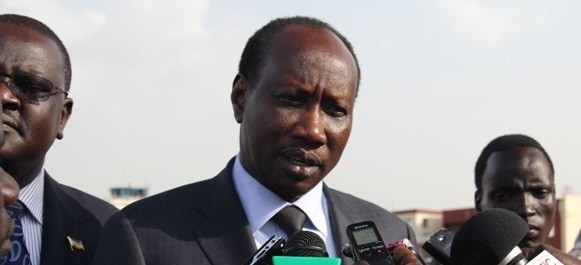This report is part of an exclusive series, ‘War Economy’, which focuses on the economic situation in South Sudan.
President Salva Kiir’s office is spending more money than the entire budget of a medium to large-sized South Sudanese state, according to financial documents reviewed by Radio Tamazuj.
Documents show that the expenditures of the Office of the President in the last fiscal year were greater than the budget of his own home state Warrap, for example, while spending during the current fiscal year is on pace to exceed the budget of the entire government of Central Equatoria State.
The national crisis since December 2013 has resulted in increasing distortions between budgeted and actual spending, with national institutions often devouring resources at the expense of state and local governments. In particular, massive wealth and resources are flowing through the president’s office.
According to a financial report on the first quarter of the current fiscal year (July-September 2014), spending on salaries in the Office of the President was 13.7 million SSP, 345% of what was budgeted.
The Finance Ministry document confirms, “The Office of the President… overspent their salaries budget for Q1 by SSP 10 million.”
At the same time, the reported staffing levels at the presidency did not significantly increase, rising from only 428 to 436 employees from the previous fiscal year to the current one, according to a document on the staffing structure of the presidency.
Based on these figures, a quick calculation shows that the average gross monthly earnings of personnel working in the Office of the President was about 10,000 SSP per month.
However, this does not necessarily mean that every employee in the presidency earned 10,000 or more SSP per month, since this is an average. Radio Tamazuj has previously reported that the government chief negotiator Nhial Deng collected $2000 per day ‘allowance’ at peace talks, while other delegation members collected $1000 or $700 per day.
This suggests that extraordinary benefits paid to certain individuals may account for at least part of the overspend by the presidency during Q1 of 2014/2015, while the formal salary scale remained unchanged. Other possible explanations include an unreported increase in staffing levels at the presidency or use of presidency staffing funds for other purposes.
Comparison to state transfers
During the fiscal year 2013/2014 the national government transferred to the Central Equatoria State government an amount of 254.7 million SSP – significantly less than the budgeted amount, according to data contained in the published Approved Budget Book 2014/2015.
Similarly, for example, Warrap State received 156.7 million in transfers and Eastern Equatoria received 152.1 million.
In the same period, the annual budget for the president’s office was 201.3 million SSP. But the presidency actual spent at least three and a half times that much, including at least 458.4 million spent by the Office of the President itself plus 238.4 million spent by the Crisis Management Committee, a body created by presidential decree and falling under the Office of the President.
Notably, another finance ministry document says the total outturn for the president’s office (including the crisis committee) in 2013/2014 was 799.6 million – a figure conflicting with the above-mentioned total. The expenses of the National Security Service, which also falls under the Office of the President, are not included in these totals.
Massive overspending
Data shows that the presidency’s spending spree continued into the first quarter of of the current fiscal year. Though the formal budget was only 54.3 million SSP, the presidency spent 200.1 million SSP during the quarter, a difference of 145.9, nearly four times the budgeted amount.
South Sudan’s finance ministry claimed that this was done for humanitarian reasons. “Overspending in the Public Administration sector was primarily driven by SSP 141 million used by the Office of the President for the repatriation of Internally Displaced People (IDP) who sought refuge in different parts of the country or abroad during the conflict,” the ministry reported.
Nonetheless, this data show that the Office of the President nearly expended its entire 2014/2015 fiscal year budget of 217 million SSP in the first quarter alone.
That compares to a total Central Equatoria State budget for this year of 415 million, of which 329.1 million are expected to be transferred from the national government.
File photo: Minister in the Office of the President Awan Guol Riak (left) with Presidential Press Secretary Ateny Wek (right)
Read more from the seres ‘War Economy’:
Secrecy around South Sudan’s dwindling central bank reserves (28 March)
South Sudan’s Lakes police paid 2 months late (27 March)
Bread price rises in South Sudan state capital (27 March)
South Sudan fiscal report delayed after Q1 overspend (27 March)
South Sudan denies printing more money (27 March)




